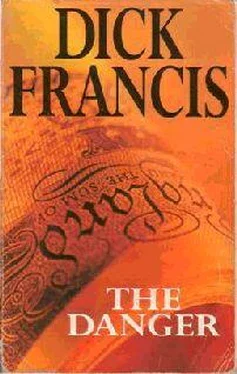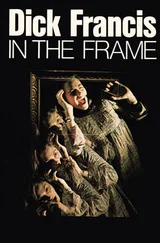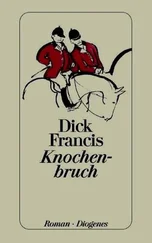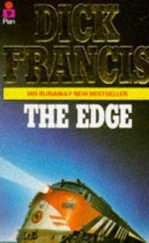'Good,' I said, and thought that if HE were me he'd check up with Alessia about the epilepsy, and be reassured.
At Casteloro, a small old town with a cobbled central square full of pigeons, the telephone Cenci sought was in a cafe, and this time there was no delay.
'Return to Mazara,' Cenci said with exhaustion.
I reversed the car and headed back the way we had come, and Cenci said, 'He asked me what I had brought the money in. I described the box.'
'What did he say?'
'Nothing. Just to follow instructions or Alessia would be killed. He said they would kill her… horribly.' His voice choked and came out as a sob.
'Listen,' I said, 'they don't want to kill her. Not now, not when they're so close. And did they say what "horribly" meant? Were they… specific?'
On another sob he said, 'No.'
'They're frightening you,' I said. 'Using threats to make sure you'd elude the carabinieri, even if up to now you'd been letting them follow you.'
'But I haven't!' he protested.
'They have to be convinced. Kidnappers are very nervous.'
It was reassuring though, I thought, that they were still making threats, because it indicated they were serious about dealing. This was no cruel dummy run: this was the actual drop.
Back at the Mazara crossroads there was another lengthy wait. Cenci sat in the caf6, visible through the window, trembling over an undrunk cup of coffee. I got out of the car, stretched, ambled up and down a bit, got back in, and yawned. Three unexceptional cars filled with petrol and the garage attendant scratched his armpits.
The sun was high, blazing out of the blue sky. An old woman in black cycled up to the crossroads, turned left, cycled away. Summer dust stirred and settled in the wake of passing vans, and I thought of Lorenzo Traventi, who had driven the last lot of ransom and now clung to life on machines.
Inside the cafe Cenci sprang to his feet, and after a while came back to the car in no better state than before. I opened the rear door for him as usual and helped him inside.
'He says…" He took a deep breath. 'He says there is a sort of shrine by the roadside between here and Casteloro. He says we've passed it twice already… but I didn't notice…'
I nodded. 'I saw it.' I closed his door and resumed my own seat.
'Well, there,' Cenci said. 'He says to put the box behind the shrine, and drive away.'
'Good,' I said with relief. 'That's it, then.'
'But Alessia…' he wailed. 'I asked him, when will Alessia be free, and he didn't answer, he just put the telephone down
I started the car and drove again towards Casteloro.
'Be patient,' I said gently. 'They'll have to count the money. To examine it for tracers. Maybe, after last time, to leave it for a while in a place they can observe, to make sure no one is tracking it by homer. They won't free Alessia until they're certain they're safe, so I'm afraid it means waiting. It means patience.'
He groaned on a long breath. 'But they'll let her go… when I've paid… they'll let her go, won't they?'
He was asking desperately for reassurance, and I said, 'Yes,' robustly: and they would let her go, I thought, if they were satisfied, if they were sane, if something unforeseen didn't happen and if Alessia hadn't seen their faces.
About ten miles from the crossroads, by a cornfield, stood a simple stone wayside shrine, a single piece of wall about five feet high by three across, with a weatherbeaten foot-high stone madonna offering blessings from a niche in front. Rain had washed away most of the blue paint of her mantle, and time or vandals had relieved her of the tip of her nose, but posies of wilting flowers lay on the ground before her. and someone had left some sweets beside her feet.
The road we were on seemed deserted, running straight in each direction. There were no woods, no cover, no obstructions. We could probably be seen for miles.
Cenci stood watching while I opened the boot, lugged out the box, and carried it to the back of the shrine. The box had just about been big enough to contain the whole ransom, and there it stood on the dusty earth, four-square, brown and ordinary, tied about with thick string to make carrying easier and cheerfully labelled with red. Almost a million pounds. The house on Mikonos, the snuff box collection, his dead wife's jewellery, the revenue forever from the olives.
Cenci stared at it blindly for a few moments, then we both returned to the car and I reversed and drove away.
For the rest of that day, Saturday, and all Sunday, Cenci walked slowly round his estate, came heavily home, drank too much brandy and lost visible weight.
Ilaria, silently defiant, went to the tennis club as usual. Luisa, her aunt, drifted about in her usual wispy fashion, touching things as if to make sure they were still there.
I drove to Bologna, sent off the films, washed the car. Lorenzo still breathed precariously on his machines and in the meagre suburban street the two kidnappers remained barricaded in the third-floor flat, with talk going on from both sides, but no action, except a delivery of milk for the baby and bread and sausage for the others.
On the Sunday evening Ilaria came into the library where I was watching the news on television. The scene in the street looked almost exactly the same, except that there was no crowd, long discouraged from lack of excitement, and perhaps fewer fawn uniforms. The television coverage had become perfunctory: repetitive as-you-were sentences only.
'Do you think they'll release her?' Ilaria said, as the screen switched away to politicians.
'Yes, I think so.'
'When?'
'Can't tell.'
'Suppose they've told the carabinieri they'll keep her until those men in the flat go free? Suppose the ransom isn't enough?'
I glanced at her. She'd spoken not with dread but as if the question didn't concern her beyond a certain morbid interest. Her face was unstudiedly calm. She appeared really not to care.
'I talked to Enrico Pucinelli this morning,' I said. 'By then they hadn't said anything like that.'
She made a small, noncommittal puffing noise through her nose and changed the television channel to a tennis match, settling to watch with concentration.
'I'm not a bitch, you know,' she said suddenly. 'I can't help it if I don't fall down and kiss the ground she walks on, like everyone else.'
'And six weeks is a long time to keep up the hair-tearing?'
'God,' she said, 'you're on the ball. And don't think I'm not glad you're here. Otherwise he would have leant on me for everything he gets from you, and I'd have ended up despising him.'
'No,' I said.
'Yes.'
Her eyes had been on the tennis throughout.
'How would you behave,' I said, 'if you had a son, and he was kidnapped?'
The eyes came round to my face. 'You're a righteous sod,' she said.
I smiled faintly. She went resolutely back to the tennis, but where her thoughts were, I couldn't tell.
Ilaria spoke perfect idiomatic English, as I'd been told Alessia did also, thanks to the British widow who had managed the Cenci household for many years after the mother's death. Luisa, Ilaria and Alessia ran things between them nowadays, and the cook in exasperation had complained to me that nothing got done properly since dear Mrs Blacken had retired to live with her brother in Eastbourne.
The next morning, during the drive to the office, Cenci said, 'Turn round, Andrew. Take me home. It's no good, I can't work. I'll sit there staring at the walls. I hear people talk but I don't listen to what they say. Take me home.'
I said neutrally. 'It might be worse at home.'
'No. Turn round. I can't face a new week in the office. Not today.'
I turned the car and drove back to the villa, where he telephoned to his secretary not to expect him.
Читать дальше












